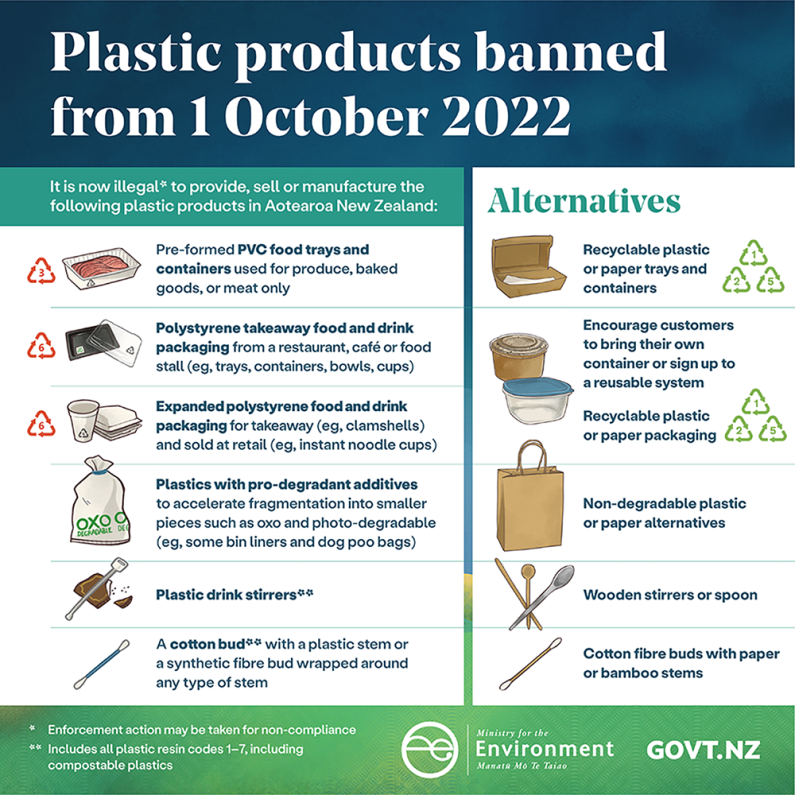Plastic product bans
From 1 October 2022, some common hard-to-recycle and single-use plastic products can no longer be provided, sold or manufactured in Aotearoa New Zealand.
These phase-outs are part of the Ministry for the Environment’s Waste Minimisation (Plastic and Related Products) Regulations 2022.
These bans particularly affect plastic containers used in food businesses, such as number 6 plastic sushi containers and expanded polystyrene clamshells, bowls, burger boxes and cups; as well as PVC meat trays (type 3 plastic). Within businesses, plastic drink stirrers, polystyrene cups, and oxo or photo-degradable plastic bin liners can also no longer be used.
Plastics being banned in October 2022
- PVC food trays and containers.
- Polystyrene takeaway food and drink packaging.
- Expanded polystyrene food and drink packaging.
- Plastic with pro-degradant additives, e.g. oxo and photo-degradable plastics.
- Plastic drink stirrers.
- Plastic stemmed cotton buds.
Information for businesses on the October 2022 plastic bans
These bans are likely to affect a range of local business and the packaging you use for takeaway and pre-prepared food.
Full information on products to be phased out and alternatives for each banned product is included on theMinistry for the Environment website.
For support in switching your packaging, get in touch with our Waste minimisation team at wasteminimisation@stratford.govt.nz or phone 06 765 6099.
Alternative food containers and packaging
Instead of PVC, polystyrene or expanded polystyrene pre-formed trays, containers, boxes or clamshells, you can use or supply the following products:
- Reusable containers and bowls, such as Again Again and Reusabowl.
- Recyclable plastic trays or containers made from PET (type 1 plastic) and PP (type 5 plastic), which can be recycled (if clean).
- Compostable fibre-based trays or containers made from paperboard, sugarcane, bamboo, wood, wheat straw etc, which can be composted in commercial or home compost systems. When selecting fibre products, choose unlined, uncoated containers where possible. These can be composted at home or in commercial composting facilities.
- Avoid containers with a plastic lining (usually polyethylene or “poly”), as these containers need to be disposed of in landfill.
- If a food barrier is needed, choose a container with a compostable plant-based plastic lining made from PLA (polylactic acid). These can be composted in commercial composting facilities.
- Avoid paperboard products with intentionally added PFAS, which are harmful to health.
- Compostable plant-based plastic containers, made from PLA (polylactic acid), which can also be called ‘Ingeo’ plant-based plastic. These can be composted in commercial composting facilities.
There are many suppliers of recyclable and compostable containers. These include:
Local suppliers:
- Bidfood Limited, 06 751 2260
- Hardy Packaging, 06 758 9036
- Pack Centre, 06 76 95615
National suppliers:
- Again Again
- Biopak
- Earthpac
- Ecoware
- FriendlyPak
- Gilmours
- Green Choice
- Huhtamaki
- Innocent Packaging
- Reusabowl
- Southern Hospitality
If you are a supplier and would like to be added to this list, please contact wasteminimisation@stratford.govt.nz
What happens if my business doesn’t comply with this product ban?
The Ministry for the Environment website contains the following information regarding compliance:
“The Ministry encourages voluntary compliance and expects that all businesses will be taking necessary steps toward ensuring they comply with the regulations.
We will use discretion when responding to any breaches of the regulations. We can respond to non-compliance in various ways ranging from education, providing verbal and written warnings through to prosecution.
In the first instance our preference is to take an educational approach and to offer advice to help businesses understand their responsibilities. The way we work is guided by our Compliance, monitoring and enforcement strategy.
The Ministry will take enforcement action where appropriate, particularly where systemic or ongoing non-compliance occurs. The Waste Minimisation Act allows for fines of up to $100,000 to be issued when parties deliberately contravene regulations under the Act. Any fines will be proportionate to the offence and all prosecution decisions are made subject to our Prosecutions policy and Enforcement decision making policy.”
For support in switching your packaging, get in touch with SDC on wasteminimisation@stratford.govt.nz or phone 06 765 6099.
Future planned plastic bans mid 2023 and 2025
Businesses should be aware that further bans are planned for some plastic products in 2023 and 2025.
Products that will be phased out by mid-2023 include:
- Plastic plates, bowls and cutlery.
- Designed for single-use and made of any type of plastic including degradable, biodegradable and compostable plastics.
- Plastic straws.
- Straws made of any type of plastic including degradable, biodegradable, and compostable plastics, such as PLA.
- Plastic produce bags.
- Plastic produce labels.
Products that will be phased out by mid-2025 include:
- All other PVC food and beverage packaging - such as some biscuit trays and containers.
- All other polystyrene food and beverage packaging - such as yoghurt and other dairy pottles and containers.


